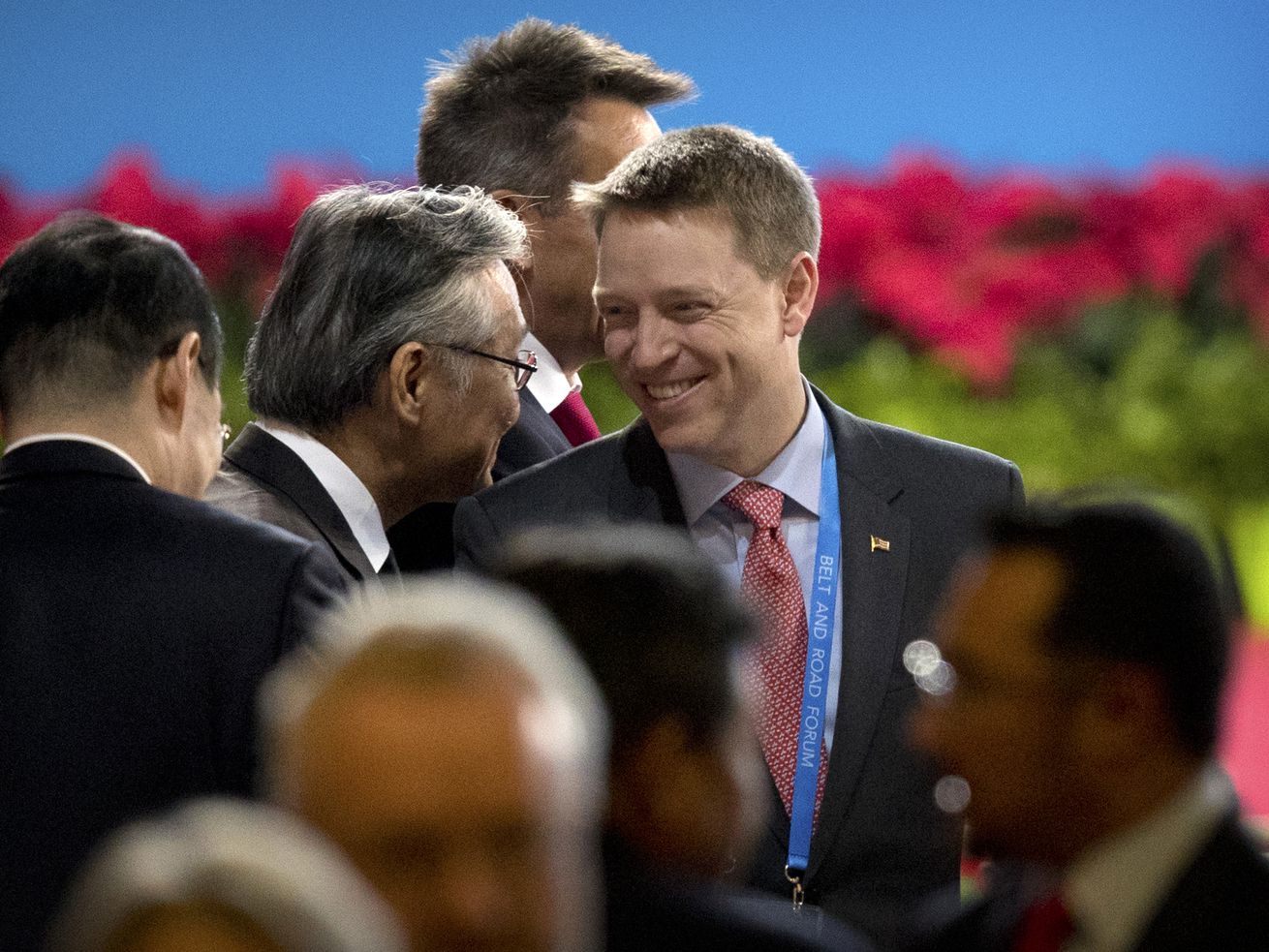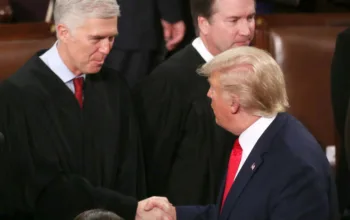How to make Beltway friends and influence policy.
Matt Pottinger served four years on President Donald Trump’s National Security Council, including 15 months as deputy adviser, and then resigned mid-insurrection. “The events of that day, January 6, were for me a red line. Decided that it was time to go, and I resigned that afternoon,” he said six months later. But he hasn’t said much about it since then.
Maybe it’s because he’s been busy, as a distinguished visiting fellow at the Hoover Institution, a conservative think tank affiliated with Stanford University. He’s also chair of the China program at the Foundation for Defense of Democracies, and a business consultant at the firm Ergo. Pottinger is most closely associated with Trump’s hardline China policy, an approach that Republicans and Democrats have come to broadly support.
Many observers initially predicted that working for Trump would turn into a scarlet letter. But service in the Trump White House in the lead-up to the “Stop the Steal” violence hasn’t necessarily been an obstacle for rejoining Washington’s establishment.
Top-level personnel, like adviser Stephen Miller and Secretary of State Mike Pompeo, haven’t been rehabilitated, and former acting Secretary of Defense Chris Miller has stayed under the radar since he testified on the Capitol riot. But senior officials and staffers a few rungs below — and former Trump officials who questioned the election results — have done fine.
This isn’t a phenomenon unique to the Trump administration. Whether it’s George W. Bush and his Iraq War or Barack Obama’s Afghanistan surge, foreign policy officials have time and time again been able to transcend their president and return to positions of power. That speaks to the unique mores of Washington, where subject matter expertise is the entry key to the elite club. Members of the foreign policy establishment protect their own — as long as they stay within the bounds of the mainstream policy ideas of the moment. This same principle protected many of the technocrats and appointees who supported the 2003 Iraq War. Their success in reestablishing themselves as trusted experts has paved the way for other acts that have been forgiven.
Trump’s foreign policy was divergent from the Washington norm: He visited Saudi Arabia as his first overseas visit, valued personal diplomacy over longstanding protocol with dictators like Kim Jong Un, and wanted to ditch NATO entirely, among many other erratic moves. But Trump’s undemocratic actions at home were even more divergent.
Critics have said that anyone who stood by Trump’s side — in any capacity — should have to answer for the former president’s anti-democratic behavior. Pottinger, for example, never publicly pushed election denialism. But critics say that’s insufficient for a national security staffer, when the US’s foreign policy is (at least purportedly) based on advancing democracy around the world.
“You can have the most well-crafted China policy in the world, but if Donald Trump prevails in his efforts to dismantle US democracy, what is the point? What are we defending?” said Ben Rhodes, who served as Obama’s deputy national security adviser. “That runs so counter to everything that the American national security establishment is supposed to claim to represent, and it kind of makes a mockery of it.”
But that subject matter expertise — plus the patina afforded by resigning on January 6 — has helped Pottinger, a former journalist, expertly navigate the post-Trump landscape. He even emerged as the White House hero of the initial Covid-19 chaos in New Yorker writer Lawrence Wright’s chronicle of “The Plague Year.”
Pottinger declined an interview request from Vox, and his attorney Mary Boies responded on his behalf. “Matt led the way resigning promptly on January 6 and that action makes spoken denunciation unnecessary and certainly not disqualifying from public service. With Matt’s counsel, the U.S. reversed decades of failed policy toward China, and the new policy has continued under the Biden Administration,” Boies wrote. “This country needs the kind of sound policy that Matt helped craft, not aggressive rhetoric that only further divides the nation.”
Yet a lot of that aggressive rhetoric has come from the president whom he served. And the siege of the Capitol was a red line for Pottinger, but apparently not Trump’s previous questioning of the integrity of the election that gave rise to the attempt to overturn it, or any number of other incidents.
But look at what that red line bought Pottinger. The act of resigning set him apart from his boss, National Security Adviser Robert O’Brien, who stayed on through the handoff to President Joe Biden two weeks later. In that role early last January, O’Brien was mostly worried about antifa counterprotesters to the insurrectionists rather than the pro-Trump insurrection itself, according to the Washington Post. O’Brien hasn’t emerged with the same prestige. He’s been working as a mediator for a Los Angeles law firm, an atypical role for a former security chief. He recently started a consulting firm with other officials from the Trump White House since many of them had difficulty securing coveted jobs, according to Bloomberg.
Yet after a full term alongside Trump, things are going well for Pottinger. This summer, he was the only former Trump White House staffer on the schedule of the eminent Aspen Security Forum. He hopped off early from a panel to serve as an expert witness at the Senate Select Committee on Intelligence. This year, Pottinger has appeared twice on CBS’s 60 Minutes to talk about the Wuhan lab leak theory of Covid-19’s origins, which he has advanced, and China’s aggressive economic policies. Neither time was he asked about Trump.
Experts get a pass
One reason that Matt Pottinger was welcomed back into the establishment is that, unlike some of Trump’s unconventional appointees, he had already been a part of the elite.
Pottinger has become the go-to expert on China’s economic and security outlook. He speaks fluent Mandarin, and as China correspondent for the Wall Street Journal, he broke news on companies and took risks to cover politically complex stories about the Communist Party. He changed careers to become a Marine in Iraq and Afghanistan, and then worked at one of the world’s largest hedge funds. Other Trump national security appointees with strong credentials before the administration — like onetime National Security Adviser H.R. McMaster or national security staffers Dina H. Powell McCormick and Nadia Schadlow — have landed similarly well.
Policy officials have often found ways to transcend party politics, even as they work for partisan leaders. In previous administrations, “there is a lot of respect on both parties for the other sides’ experts even when they vehemently disagree. Policy disagreements are normal and helpful,” said Elizabeth Saunders, a professor at Georgetown University who focuses on the presidency and foreign policy.
In some ways, this is a practical consideration. “Someone’s got to keep the lights on. Someone’s got to run China policy no matter how much you think the president’s good, bad, antidemocratic,” explains Saunders.
A concern raised by scholars of US foreign policy is the thin bench of potential staffers for a future Republican administration. If the Democrats were to lose in 2024, it will have been over a decade since a mainstream GOP candidate took the executive branch, and there are thousands of jobs that would need to be filled.
This pursuit of Republican foreign policy thinkers — to serve on public panels, testify to Congress, or author articles for prestigious journals like Foreign Affairs — has made it appealing to hear from people like Pottinger or McMaster, who do have recent high-level government experience.
/cdn.vox-cdn.com/uploads/chorus_asset/file/23148086/GettyImages_872381484.jpg) AFP via Getty Images
AFP via Getty ImagesBut that deference extends mainly to policy staffers and experts who hew to Washington’s established worldview. It is worth emphasizing the Biden administration’s continuity with Trump in implementing many of the hawkish China policies of tariffs, sanctions, and strategic competition put forward by Pottinger. “There is a very narrow range of acceptable opinion, and if you’re within it you can weather a lot. Both Pottinger and O’Brien in many respects are inside the Beltway consensus on the big issues of the day,” said Michael Desch, a political scientist at the University of Notre Dame.
It’s part of the unwritten rules of the elite club of Washington. “If you criticize NATO enlargement or Israel or some of the more foundational cornerstones of post-Cold War American foreign policy, you are more likely to be cast aside than if you worked for years for Donald Trump. And that’s just crazy,” Rhodes said.
Lack of accountability is self-perpetuating
There certainly are former Trump advisers who haven’t been welcomed back, like the short-lived National Security Adviser Michael Flynn, who pleaded guilty to lying to the FBI and has encouraged challenges to the 2020 election’s integrity. Steve Bannon isn’t speaking at any centrist think tanks or universities anytime soon. But their cases are exceptions that prove the rule. “For me, the real story is the ability of inside-the-Beltway people to escape accountability for dumb things they did when in office, and I think it’s broader than just the Trump administration,” Desch said.
Many attribute the reentry of some Trump officials to Washington to a broader lack of reckoning for the enablers of the Iraq War. It’s well established at this point that President George W. Bush’s primary rationale for invading Iraq, Saddam Hussein’s weapons of mass destruction, was an outright lie. “The Bush administration had to work assiduously and I think at times dishonestly to make the case for war, and observing after the fact, I can’t point to anyone who was sanctioned for supporting the war,” said Christopher Preble of the Atlantic Council, a global affairs think tank in Washington.
Secretary of Defense Donald Rumsfeld, who planned the war, and Secretary of State Colin Powell, who advocated for it at the United Nations, both maintained platforms before their deaths this year, as have their acolytes. Consider David Frum, the speechwriter who coined the “Axis of Evil” tagline that helped sell the war, who has rebranded himself as a popular columnist for the Atlantic.
And powerful Democrats (Joe Biden, John Kerry, Hillary Clinton) voted for the war. It’s not just that there were never trials or prosecutions for the Bush officials, or tough questions to their cheerleaders in academic, media, and think tank circles; support for the Iraq debacle has never really been an impediment to career advancement. Quite the opposite: None of the 33 scholars who signed onto an anti-Iraq War ad in the New York Times two decades ago have ascended to government roles, notes scholar Stephen Walt in The Hell of Good Intentions.
It’s rare that those who perpetuated foreign policy disasters are even asked about them; one of the few times a journalist did pose such a question produced a revealing sound bite.
Broadcast journalist Mehdi Hasan asked John Bolton, the senior Bush diplomat who went on to be Trump’s national security adviser from 2018 to 2019, whether he regretted advocating for the Iraq War, especially in light of the hundreds of thousands of civilians who died. “You don’t know what you’re talking about,” Bolton said, and called the war a “brilliant military victory by the United States and other coalition forces.”
Me: “All those innocent Iraqi civilians. All the men and women, children killed by U.S. airstrikes. Some in massacres…None of those weigh on your conscience? None of those keep you up at night?”
John Bolton: “You don’t know what you’re talking about.”pic.twitter.com/nSMmZGg1cJ
— Mehdi Hasan (@mehdirhasan) October 15, 2020
The persistent failures of US foreign policy since the Cold War, and the lack of accountability for those failures, helped give rise to Trump, argues Walt. He writes that “perhaps the greatest barrier to genuine accountability is the self-interest of the foreign policy establishment itself. Its members are reluctant to judge one another harshly and are ready to forgive mistakes lest they be judged themselves.”
Other experts have a more generous interpretation of how Washington slouched toward Baghdad. Kori Schake, a former Bush official now at the American Enterprise Institute, told me that policymakers are implementing decisions based on imperfect information and short timelines. “If you are going to have in government people who have never made an inaccurate judgment on foreign and defense policy, you are going to have almost no one who meets this standard,” she said.
There may be other analogues for the current moment. Few of the Ronald Reagan officials associated with the Iran-Contra arms scandal were rehabilitated. Robert McNamara, the former defense secretary during seven of the most devastating years of the Vietnam War, repudiated his views and still was never really welcomed back into the establishment. “At the end of the day, it comes down to questions of integrity,” Schake said. “Do you judge that these are people of good faith trying to do the right thing? Or do you think they’re a danger and need to be cordoned off from potential future roles?”
As Pottinger said last summer, “I’m proud of a lot of things that the administration did, and I think I’ll look back on those years as ones that I’m proud of.”
Author: Jonathan Guyer
Read More



